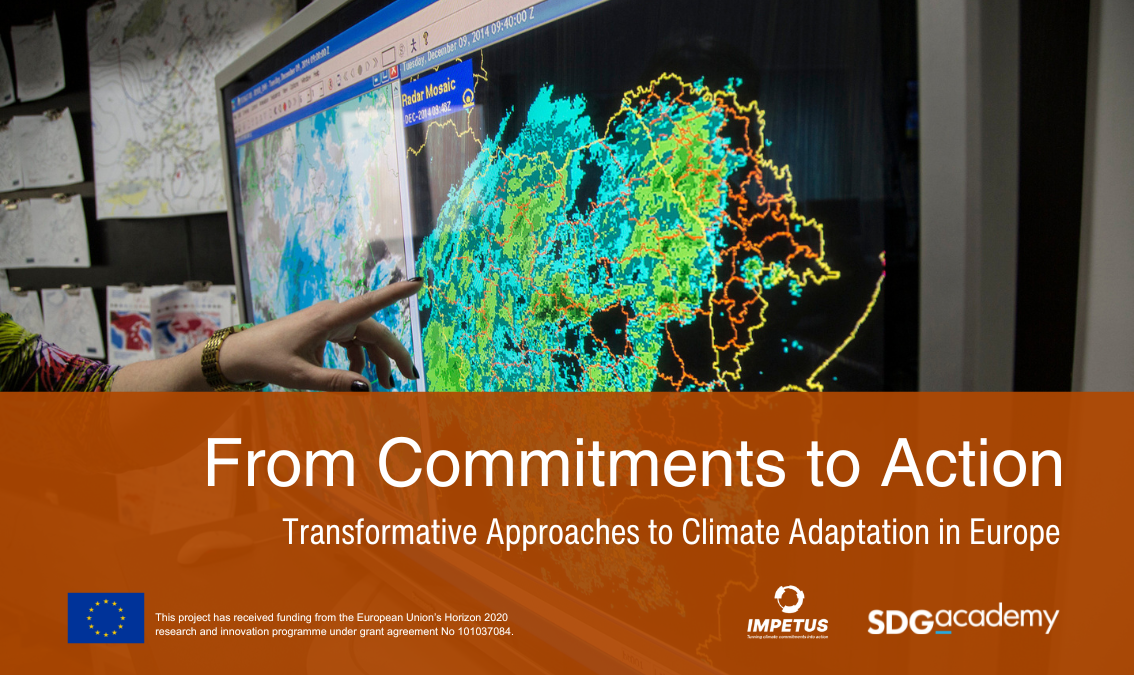Article originally posted on the IMPETUS blog
Transformative Approaches to Climate Adaptation in Europe: Enroll in the New MOOC by IMPETUS in collaboration with the SDGAcademy
Are you ready to take action against climate change? Climate adaptation is no longer a distant goal—it’s an immediate necessity. As the world faces unprecedented environmental challenges, Europe is leading the way with innovative strategies to become climate resilient by 2050. To help you navigate and contribute to this crucial transformation, the IMPETUS project, in collaboration with partners at the Sustainable Development Solutions Network and the SDGAcademy, is excited to present its new MOOC: From Commitments to Action: Transformative Approaches to Climate Adaptation in Europe.
Why This Course Matters
The impact of climate change is undeniable, affecting everything from ecosystems and health to economies and infrastructure. The European Union, recognizing the urgency, adopted a comprehensive strategy on adaptation to climate change in 2021. This strategy is a key component of the European Green Deal, aimed at making Europe the first climate-neutral continent by mid-century.
But how do these large-scale commitments translate into actionable strategies? How can local communities, businesses, and governments implement sustainable solutions that not only mitigate climate risks but also foster economic and social resilience? This course answers these questions by delving deep into the science, policy, and innovative practices that are shaping Europe’s climate adaptation efforts.
What You’ll Learn
This course offers a holistic view of climate adaptation, covering a wide range of topics designed to equip you with the knowledge and tools needed to make a difference:
- Climate Change Science & Policy: Understand the basics of climate change, its far-reaching impacts, and the policy frameworks driving global and European climate action, including the Paris Agreement and the EU’s Green Deal.
- Innovative Adaptation Solutions: Explore cutting-edge approaches to climate adaptation, such as sewer mining technology, sand dune restoration, and marine spatial planning. Learn how these solutions are implemented at local and regional levels across Europe.
- Data and Digital Technologies: Discover how data platforms and digital tools are revolutionizing climate adaptation, enabling evidence-based decision-making and policy formulation.
- Socio-Economic Narratives & Financial Instruments: Dive into the economic aspects of climate adaptation, from valuation methods to the development of financial instruments that support sustainable and equitable transition pathways.
- Skills for the Future: Learn about the evolving landscape of the labor market, where new green and digital jobs are emerging, and understand how to prepare for the demands of this transformation.
Who Should Enroll?
This MOOC is tailored for a broad audience, including graduate and advanced undergraduate students, professionals in the sustainable development sector, policymakers, and anyone passionate about climate action. Whether you’re just starting your journey in environmental studies or you’re a seasoned professional looking to deepen your understanding, this course offers valuable insights and practical knowledge.
Course Details:
- Institution: SDGAcademy
- Level: Introductory
- Prerequisites: None
- Language: English
- Video Transcript: English
Enroll Now and start your journey towards understanding and implementing innovative climate adaptation strategies in Europe.
About the SDGAcademy
SDGAcademy is a leader in providing high-quality, accessible education on sustainable development. The courses are designed by experts and practitioners who are at the forefront of their fields, ensuring that you receive up-to-date and relevant information. With this course, you’ll not only gain a comprehensive understanding of climate adaptation in Europe but also learn how to apply these concepts in various contexts, potentially influencing global climate strategies.



